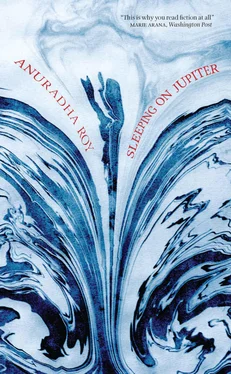He neither frowned nor smiled nor asked a question nor shouted a scolding. He did nothing. But Nomi remembered how he did not take his eyes off her, how she had that familiar sense he could see right into her. Did a breeze rustle the leaves of the tree or was it utterly, absolutely still? She thought maybe a low rumble of thunder had sounded from behind the clouds. She knew she had wanted to cry. She could not move a limb. She had the sickening feeling that if she moved she would wet herself. She clenched her muscles.
Guruji had said, “Come down. Just take one step at a time and you’ll come down. Look at your feet, there’s a fork in the branches near you.” He sounded kind and was smiling. Nomi knew that punishments at the ashram were terrible, sometimes the girls could not walk for days after a beating. But if Guruji was smiling, she thought she might escape with just a cane on her palm. She started climbing down, knot after knot, fork after fork. It was only right at the end that she put her foot on a weak branch and it creaked and splintered and then broke. She crashed through the rest of the tree, down among the seeds of the broken fruit, at Guruji’s feet.
He bent towards her. He put his hands under her arms and pulled her up. Nomi was shaking, she remembered that clearly: the way her whole body shook. She was hurting all over. Her foot had a cut, her toes were stubbed, the skin of her knees had been scraped away, her frock was torn where it had caught on the tree. Guruji held her hand and led her towards his cottage. He put her on his lap facing him, the way her mother used to when she oiled Nomi before a bath. She would make her lie flat on her outstretched legs, the child’s feet towards her chest. I was so small then, Nomi thought, the whole length of me fitted along my mother’s legs.
Guruji sat on the stairs to his cottage holding her foot. He looked at the bit that was bleeding. He wiped the blood away with his chadar. Through her pain and fear, Nomi had marvelled at how he didn’t care that the blood and mud were spoiling his clothes. He had stroked the skin around the bleeding part of the foot and then lowered his head towards it. She thought he was going to put her toes into his mouth and suck the blood away the way she did when she cut herself. But he only blew on the cuts so that they felt cool. He said, “Don’t do things that are forbidden. There is a reason why. When you want fruit, just ask me.”
He set her down and stood up. And then, out of thin air, from the folds of his chadar, he had produced a ripe pomegranate. Just like that! Everyone said Guruji performed miracles, they said he could produce sweets and sacred ash from nothing. But the two girls had never seen it happen. At the sight of the miracle pomegranate, Piku squealed. Guruji merely smiled. He held the fruit out towards the children and said, “Share this.”
How gentle was his voice that day, how his skin gleamed and his large eyes shone! His hair was a dark cloud that lay on his shoulders and his teeth were very white. She remembered he had looked and sounded as she used to think God must look and sound.
That night Nomi had stayed awake holding her half of the pomegranate. She had eaten a bead from it for the taste. It was sweeter than anything she knew. She had sucked on the seed until nothing was left of it but a tasteless grain. Then she chewed that and swallowed it. Next to her, Piku was mumbling in her sleep. She had clawed out the seeds from her half of the fruit, dripping red juice, the moment Guruji had gone into his cottage. Nomi had not eaten it then, and hours later, after sucking on that single bead, she did not eat any more. It was the only proof she had of what she had seen. Everyone said he was God. Now she knew they were right. She stayed awake for most of the night with the fruit next to her pillow. She did not know when she fell asleep. In the morning the fruit’s pulp was like blood on her sheets. Dark red.
Nomi opened her eyes. As if she were rising from below water, she heard sounds again, saw that there were people everywhere, the tea man had many customers, and there were three children pointing at her and giggling from a few feet away. She must remain calm, she must remember why she was there. She had work to do. She lifted her camera, looking through the lens. Suraj swam into view again. She zoomed in until he was close enough for her to see the strands of grey in his hair and the dark brown handle of his knife. When they had met after weeks of talking on e-mail about the film locations they were to scout, he had looked at her in the way people did: with a certain wariness, the kind that comes from encountering up close an animal that might prove unpredictable. His eyes had rested on her when he thought she wouldn’t notice, taking the measure of her. She was used to it and often played up to it, acting more erratic than she was. It was both method and disguise, one she had perfected as the eternal outsider, a way to disappear when physical escape was impossible.
As she turned her camera away from him out to the sea, she saw something else. Moving to find a better angle, she toppled her umbrella, tipped over her tea and crushed the cup. Her lens was now focused on a monk in the water. He was wearing dark glasses. His long white hair was loose to his shoulders. His chunky fingers were counting beads off a rosary.
She was about to take a photograph, but something made her stop: although far off, the monk appeared to be looking straight into her lens. His eyebrows, she could see, were as white as his hair.
She let go of the camera. She got up and started to run down the beach, past the hotels, around the upturned boats, away from the crowds and into a birch forest, threading her way through the bone-white trunks of trees, the glow of a burning house in the distance, away from blood streaming down its wall and in her head a girl’s voice cried out again and again for her brother, so loudly that she did not hear Johnny Toppo agitating for his money until he was in front of her, blocking her way. She could see dark stars. She closed her eyes, opened them again, saw that the sun had gone and the sea had turned to foaming blood.
When I was eight I was given duties in the ashram, like the other boat girls. My new work was to help in the gardens. I knew nothing about plants and I was born clumsy. I would step on one plant when trying to reach another. I would uproot freshly-planted seedlings when weeding. Gradually I became better at it and in time it would become the only bond between me and my foster mother. I don’t know why I became a sullen, monosyllabic lump around her. She persisted in being friendly, but her efforts only oppressed me. I felt trapped and restless, I would try to put up with her talk, try and try, then before I could stop myself I would leave her in mid-sentence and walk out through the door. One day, three long, fraught years after I had started living with her, I saw her looking out of the window at me. I was kneeling over the hard, cold earth planting bulbs for the spring. The fat promise of those bulbs: I had loved them even at the ashram, where we planted tuberoses and lilies. A bulb was a secret between the soil and me until the green tips of leaves poked out months later and gave it away. That day I was planting the crocuses, snowdrops, tulips, and daffodils my foster mother liked. When she saw me she came out and began to plant them too, some distance away. As we progressed along our patches, we moved closer and closer. Above us, the slate grey sky was low. There were powdery drops of rain on our anoraks. I said nothing, but I may have smiled at her. I saw her pale pink lips tremble, and when her glasses misted over she said it was the rain.
In the ashram’s gardens I had to work with a man who had recently arrived. He once told me he had been a refugee like us, and from the same place, but he had spent a few years hiding in the forests between our old country and this one. Nobody knew what had happened to him in those years and nobody asked. We never spoke about that part of our lives.
Читать дальше












